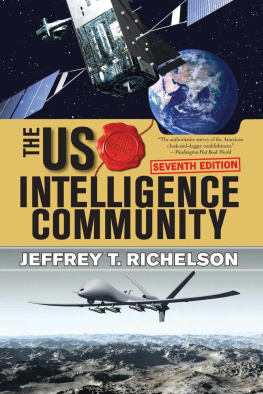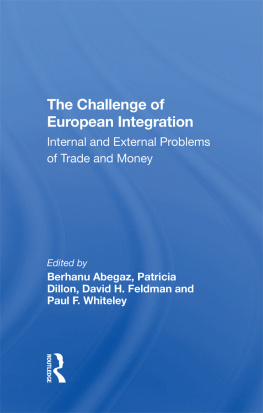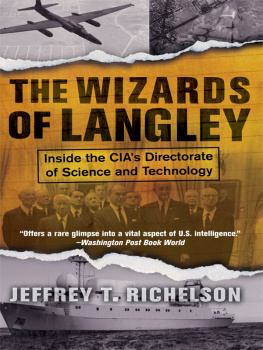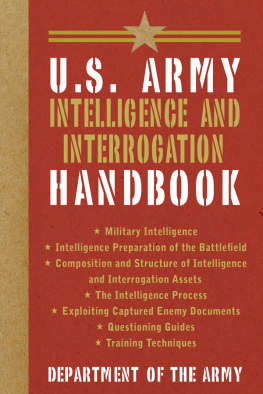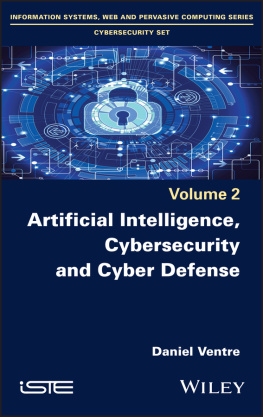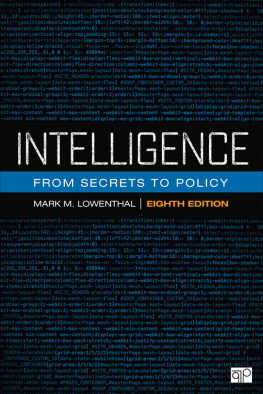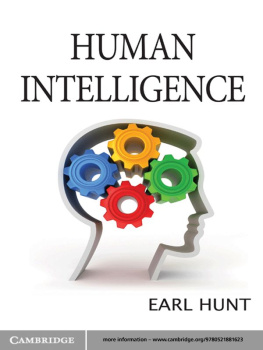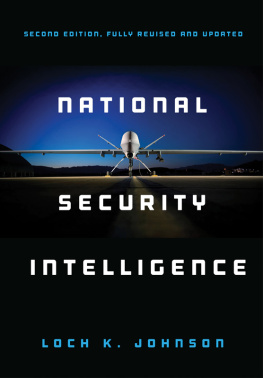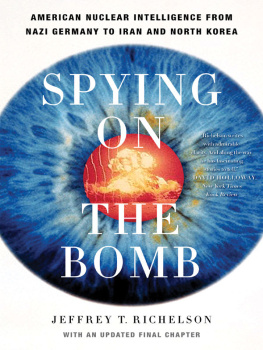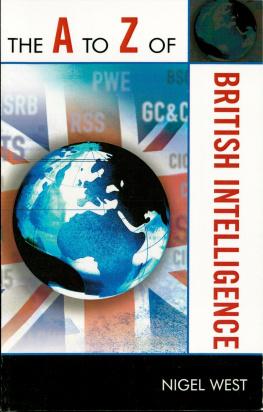THE U.S. INTELLIGENCE COMMUNITY

Westview Press was founded in 1975 in Boulder, Colorado, by notable publisher and intellectual Fred Praeger. Westview Press continues to publish scholarly titles and high-quality undergraduate-and graduate-level textbooks in core social science disciplines. With books developed, written, and edited with the needs of serious nonfiction readers, professors, and students in mind, Westview Press honors its long history of publishing books that matter.
Copyright 2016 by Jeffrey T. Richelson
Published by Westview Press,
A Member of the Perseus Books Group
2465 Central Avenue
Boulder, CO 80301
www.westviewpress.com
All rights reserved. Printed in the United States of America. No part of this book may be reproduced in any manner whatsoever without written permission except in the case of brief quotations embodied in critical articles and reviews.
Every effort has been made to secure required permissions for all text, images, maps, and other art reprinted in this volume.
Westview Press books are available at special discounts for bulk purchases in the United States by corporations, institutions, and other organizations. For more information, please contact the Special Markets Department at the Perseus Books Group, 2300 Chestnut Street, Suite 200, Philadelphia, PA 19103, or call (800) 810-4145, ext. 5000, or e-mail .
Library of Congress Cataloging-in-Publication Data
Richelson, Jeffrey.
The U.S. intelligence community / Jeffrey T Richelson. -- Seventh edition.
pages cm
Includes bibliographical references and index.
ISBN 978-0-8133-4919-0 (e-book) 1. Intelligence service--United States. I. Title.
JK468.I6R53 2015
327.1273--dc23
2015005759
10 9 8 7 6 5 4 3 2 1
CONTENTS
TABLES
FIGURES
PHOTOS
As with past editions, this book is titled The U.S. Intelligence Community, although it might be more properly titled The U.S. Intelligence Community Plus. The home page of the Office of the Director of National Intelligence (ODNI) describes the Intelligence Community as a coalition of 17 agencies and organizations, including the ODNI, within the Executive Branch that work both independently and collaboratively to gather and analyze the intelligence necessary to conduct foreign relations and national security activities. Such a description is highly misleading because a number of organizations that are counted as single entitiesincluding the Defense Intelligence Agency, the 25th Air Force, and the ODNI itselfcontain within them a number of entities that are, in reality, distinct organizations. In addition, there exist numerous intelligence organizations and activities that take place outside the designated Intelligence Community organizations. Thus, the U.S. Intelligence Community represents a subset of what might be referred to as the Federal Intelligence Enterprise.
Although not all of the federal intelligence organizations and activities outside the Intelligence Community are discussed in this work, a good number areas they have been in earlier editions. To omit them would create a misleading impression as to the nature of U.S. intelligence organization and activities. Organizations thus discussed include the intelligence components of the Unified Commands, while entities that are not part of the Intelligence Community manage a number of the strategic measurement and signature intelligence (MASINT) and space surveillance activities described.
This edition involves a number of changes in terms of organization and titles. I have reversed the order of the chapters on departmental civilian intelligence organizations and Unified Command intelligence organizations, reflecting the fact that the latter are not officially part of the Intelligence Community. I have titled , Open Sources, Site Exploitation, and Foreign Materiel Acquisition, reflects my decision to move discussions of emplaced sensors into the chapters covering the relevant disciplines.
The content of the book, of course, reflects both its basic structure and the developments since the sixth edition went to press in the spring of 2011. These most prominently include the raid that resulted in the demise of Osama bin Laden, the administrations release of a white paper concerning targeted killings, and the disclosures concerning U.S. and allied signals intelligence activities that have appeared in (or on the websites of) the Intercept, Guardian, Washington Post, New York Times, Der Spiegel, and elsewhere. For the first nineteen chapters I have tried to maintain a neutral approach in the discussion of U.S. intelligence activitiesparticularly as I find annoying books whose authors would claim to be objective but whose constant, one-sided editorializing suggests that they are not.
The final chapter contains my discussion of five issuesthe extent of U.S. intelligence operations around the world, the covert (and not so covert) fight against terrorist organizations, domestic surveillance by the FBI and NSA, congressional oversight, and secrecy and leaksas well as some observations on the extent to which Intelligence Community performance with regard to transparency and civil liberties reflects not so much the unique circumstances of the intelligence world but problems in bureaucratic behavior at all levels of government.

The information in this book comes from a variety of sources: interviews; official documents, many obtained under the Freedom of Information Act (FOIA); books written by former intelligence officers, journalists, and academics; websites; trade and technical publications; and newspapers and magazines. The public literature on intelligence is vast, and I have done my best to sort the wheat from the chaff. I have also sought to incorporate the most recent information available at each stage of the production process to minimize the inevitable discrepancies between the situation described and the situation at the time of publication. In addition, I have identified sources to the maximum extent possible, while protecting the identities of those individuals who wish to remain anonymous.
A number of institutions and individuals were instrumental in providing material for this book. There are the FOIA and public affairs offices and officers who responded to my requests (although some deserve to be noted for their obstruction, which I will do in ) sites.
In addition, those who provided assistance have included Matthew Aid, William Burr, Ted Molczan, and Robert Windrem, and they have my thanks. I would also like to thank the National Security Archive for its support in a variety of ways. Finally, thanks are due to Ada Fung, Krista Anderson, Carolyn Sobczak, Jennifer Kelland Fagan, and others at Westview who turned my manuscript into a book.

The U.S. government contains a substantial number of officials and organizations that require intelligence (domestic or foreign) to fulfill their responsibilities, whether those responsibilities involve making policy or implementing it. Intelligence can be defined as the product resulting from the collection, processing, integration, evaluation, analysis, and interpretation of available information concerning foreign nations, hostile or potentially hostile forces or elements, or areas of actual or potential operations. Those individuals and institutions that deal with national security issues have the most prominent need for such intelligence. Hence, the President and his National Security Advisor, the Vice President, the National Security Council and its staff, the Departments of State, Defense, Homeland Security, Treasury, and Justice, the Joint Chiefs of Staff (JCS) and their Joint Staff, the military services, and the general and admirals who head the nations unified commands are the most obvious consumers of foreign and domestic intelligence.
Next page
